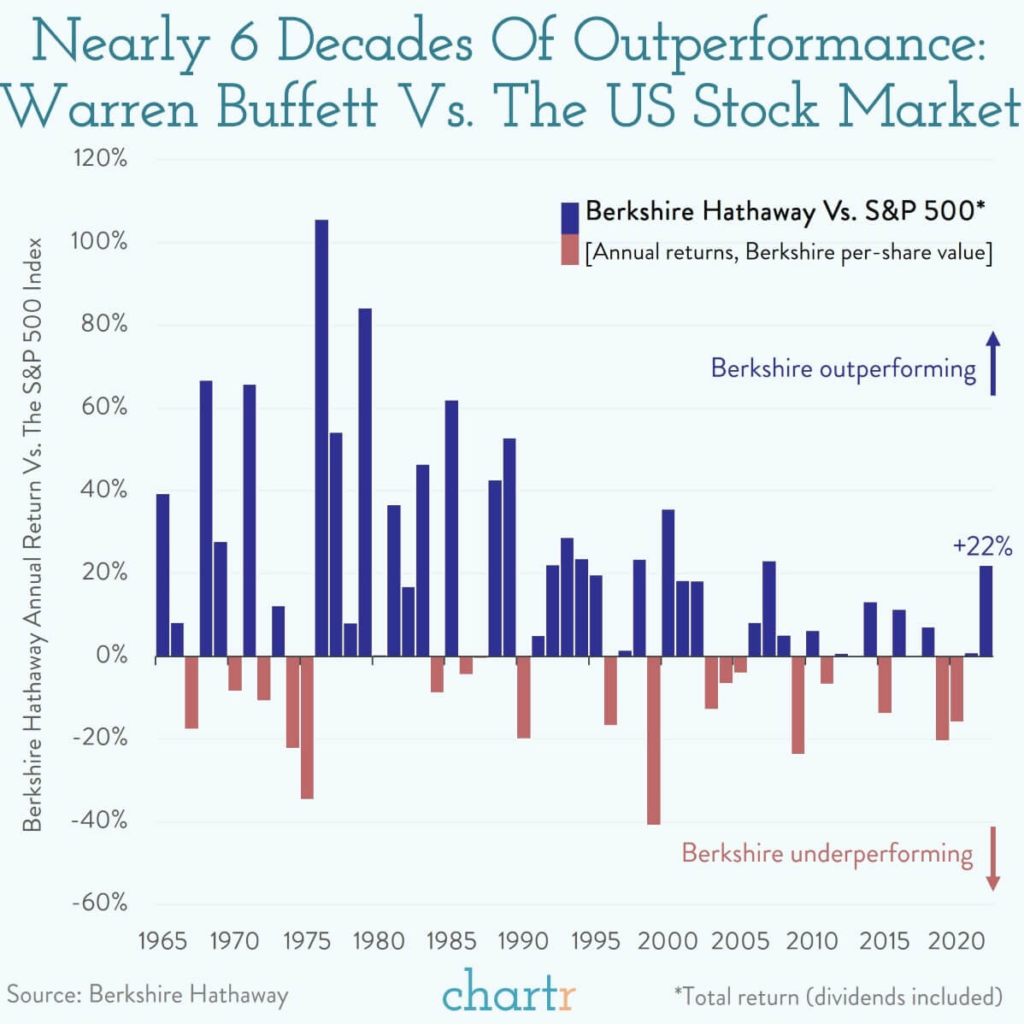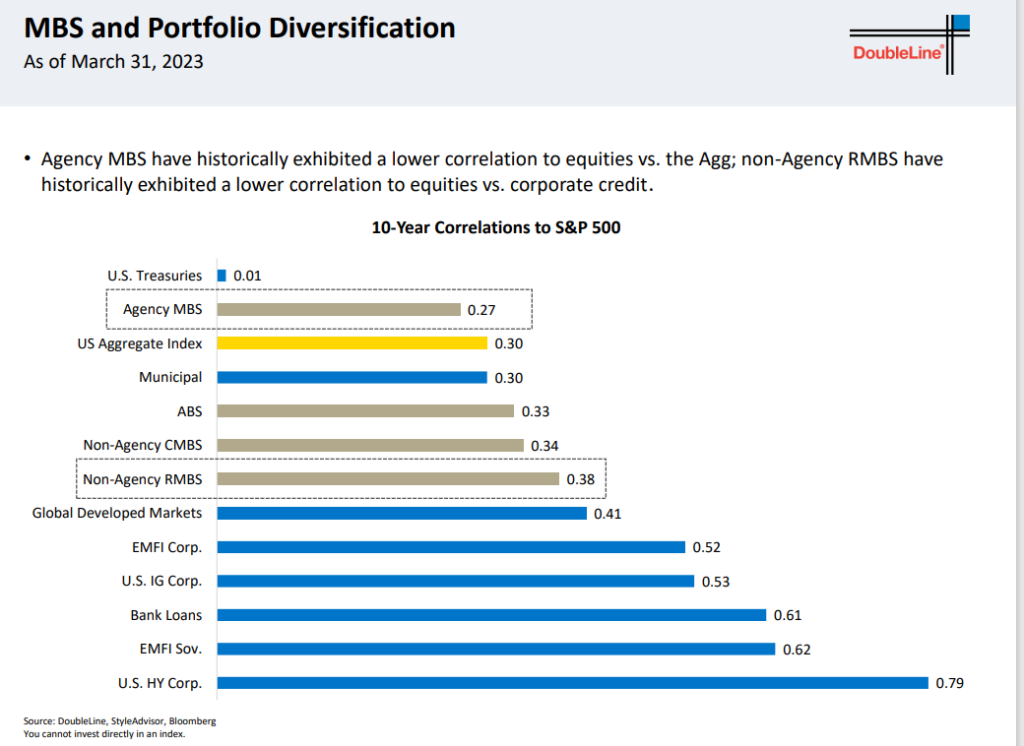1. Tech Relative Performance vs. S&P 500 Sets New Record.
From Marlin Capital

https://twitter.com/Marlin_Capital
2. First Time in History Investment Grade Bonds Yield Less than 3 Month T-Bills

https://twitter.com/JulianKlymochko
3. Buffett Performance.
Huge periods of underperformance during bubble years….1999-2000….2021-2021. Biggest outperformance years bunched in 1970’s-1980’s

4. 10-Year Correlations to S&P 500

5. Goldman Hedge Fund Clients Record Bearish.
Equities: Hedge fund clients haven’t been this bearish on stocks in at least a decade.

Source: Goldman Sachshttps://dailyshotbrief.com/
6. Transport Stocks Still in Downtrend.

7. Megacaps Still Carrying Their Weight
Bespoke Investment Group Heading into earnings season, there was a considerable amount of angst on the part of investors regarding the mecacap stocks and how they would react to their earnings reports. Given their outperformance in Q1, the prevailing view was that the bar was too high, leaving the megacaps susceptible to disappointment when they reported. Within the S&P 500, there are seven companies whose weighting exceeds 1.5% in the index, and in the chart below we list the performance of each company’s stock (largest to smallest) on the earnings reaction day of their most recent report. Of the seven companies highlighted, only two (Alphabet and Amazon.com) declined in reaction to their reports. Two stocks (Nvidia and Meta) surged more than 10%, one (Microsoft) rallied more than 7%, and Apple, with its weighting of over 7%, managed to rise more than 4.5% following its report last week. There’s still a ton of reports left to get through before earnings season winds down, but on a market cap basis, we’re past the peak, and based on the reactions of the largest companies in the market, it’s been a much better earnings season than most investors expected.

https://www.bespokepremium.com/
8. First Week in May KRE-Regional Bank ETF $360million in Inflows.
Bloomberg-Net inflows into KRE, which tracks the KBW Regional Banking Index, is down 35% this year, despite a 6.3% rally on Friday. The fund’s net inflows topped $360 million in the first week of May after attracting more than $1.5 billion in March and April combined, according to data compiled by Bloomberg. Although it’s impossible to say exactly who’s buying, a chunk of it is likely retail investors, said James Seyffart, ETF analyst for Bloomberg Intelligence. Claire Ballentine and Paulina Cachero https://www.bloomberg.com/news/articles/2023-05-08/regional-bank-stocks-retail-traders-buy-into-volatility-for-quick-gains?srnd=premium&sref=GGda9y2L

9. U.S. Adults Fear of Public Speaking Scott Galloway

https://www.profgalloway.com/storytelling/
10. How Does Food Affect Your Brain?
This is how everything you eat may directly or indirectly affect your brain. Gary Wenk Ph.D.
THE BASICS
KEY POINTS
- Foods will only act upon one’s brain if they in some way chemically resemble an actual neurotransmitter within the brain or affect brain health.
- Food has both negative and positive effects; it all depends upon which food you consume, how much you consume, and for how long.
- If you wish to alter your current brain function or slow your brain’s aging, you likely need to consume different foods.
Almost everything you choose to consume will directly or indirectly affect your brain. The contents of one’s diet will only act upon one’s brain if in some way they chemically resemble an actual neurotransmitter within the brain or if they are able to interact with an essential biochemical process in the brain that influences the production, release, or inactivation of a neurotransmitter, or the general health of the neuron itself.
Food should be viewed in the same way that we view drugs; they interact with many brain processes and alter how we think and feel. Your brain cannot tell the difference between a food (which is a chemical we consume for its nutritional value) and a drug (which is a chemical we consume for its potential positive benefits on our health).
Obviously, some things we consume affect us more than others. For the purposes of this article, I’m going to define food as anything we take into our bodies, whether it’s nutritious or not; this includes spices, plants, animal parts, drugs of any kind, coffee, tea, nicotine, and chocolate. In order to better understand how food affects the brain it will be helpful to divide them into three categories.
First, those foods we consume in high doses with acute dosing: for example, coffee, sugar, heroin, alcohol, nicotine, marijuana, some spices, and a few psychoactive plants and mushrooms. Their effects are almost immediate and depend upon how much reaches the brain.
In this class, the most important consideration is to get enough of the chemical from within the food to its site of action in our brain to actually produce some kind of effect that we can notice and associate with consuming that particular food. Most of the time, this simply does not happen.
For example, consider nutmeg, it contains two chemicals that our bodies convert into the popular street drug called ecstasy. Yet if we consumed the entire canister of the spice, our guts will notice (with terrible diarrhea) and there is a good chance that we will hallucinate for about 48 hours. According to my students, the experience is quite unpleasant.
Secondly are those foods that affect our brain slowly over a period of a few days to weeks. This is usually called “precursor-loading” and would include many different amino acids (tryptophan and lysine are good examples); carbohydrates that have a high glycemic index such as potatoes, bagels, and rice; fava beans; some minerals (iron and magnesium in particular); lecithin-containing products such as donuts, eggs, and cakes; chocolate; and the water-soluble vitamins. Their purpose is to bias the function of a specific transmitter system; usually to enhance its function in the brain.
For example, scientists once thought that drinking a glass of warm milk before bed or eating a large meal of protein made us drowsy because of tryptophan loading. The current evidence does not support this, but the claim makes my major point: We must get enough of any particular nutrient/chemical to the right place and at the right dose in our brain in order for us to notice any effects. (Unfortunately, in this case, tryptophan has difficulty getting into our brains.)
So, what’s the scientific evidence for considering the cognitive effects of these foods? Mostly, it’s related to what happens when we do not get enough of them.
For example, studies have shown that consuming too little tryptophan makes us depressed and angry and has been blamed for multiple wars and acts of cannibalism. Too little sugar or water-soluble vitamins (the Bs and C) will induce changes in brain function that we will notice after a few days of deprivation. Many authors jump to the conclusion that giving high doses of such nutrients will rapidly improve our mood or thinking: sadly, this is rarely the case. Ordinarily, the foods in this category require more time to affect our brains than those foods in the first category.
The third category includes the slow-acting, lifetime dosing nutrients that have been popular topics in the press recently. This category includes anti-oxidant-rich foods such as colorful fruit and vegetables, fish and olive oils; fruit juices, anti-inflammatory plants and drugs such as aspirin, some steroids, cinnamon, and some other spices; nicotine, caffeine, and chocolate; the fat-soluble vitamins; nuts; legumes; and beer and red wine.
People who eat these foods do not report acute changes in their thoughts or moods (depending upon how much they consume!) but certainly benefit from consuming them regularly over their life span. In general, the benefit comes from the fact that all of these foods provide our brains with some form of protection against the deadliest thing we expose ourselves to every day—oxygen.
Because we consume food, we must consume oxygen. Because we consume oxygen, we age. Thus, people who live the longest tend to eat food rich in antioxidants or simply eat a lot less food. Recent studies suggest that nicotine and caffeine prevent the toxic actions of oxygen in our brains, which is why I’ve included them here.
You can see that depending upon how you frame the question about foods and the brain, you get a different list of foods and a different reason for consuming them. If you wish to alter your current brain function or slow your brain’s aging, you likely need to consume different foods.
But in truth, no one ever considers these distinctions when eating—we just eat what tastes good. Sadly, our brains powerfully reward us when we eat sugar, fat, and salt; thus we have obesity and an oncoming epidemic of obesity-related illnesses. Consequently, like drugs, food has both negative and positive effects and it all depends upon which food you consume, how much you consume, and for how long.
https://www.psychologytoday.com/us/blog/your-brain-on-food/202305/how-does-food-affect-your-brain